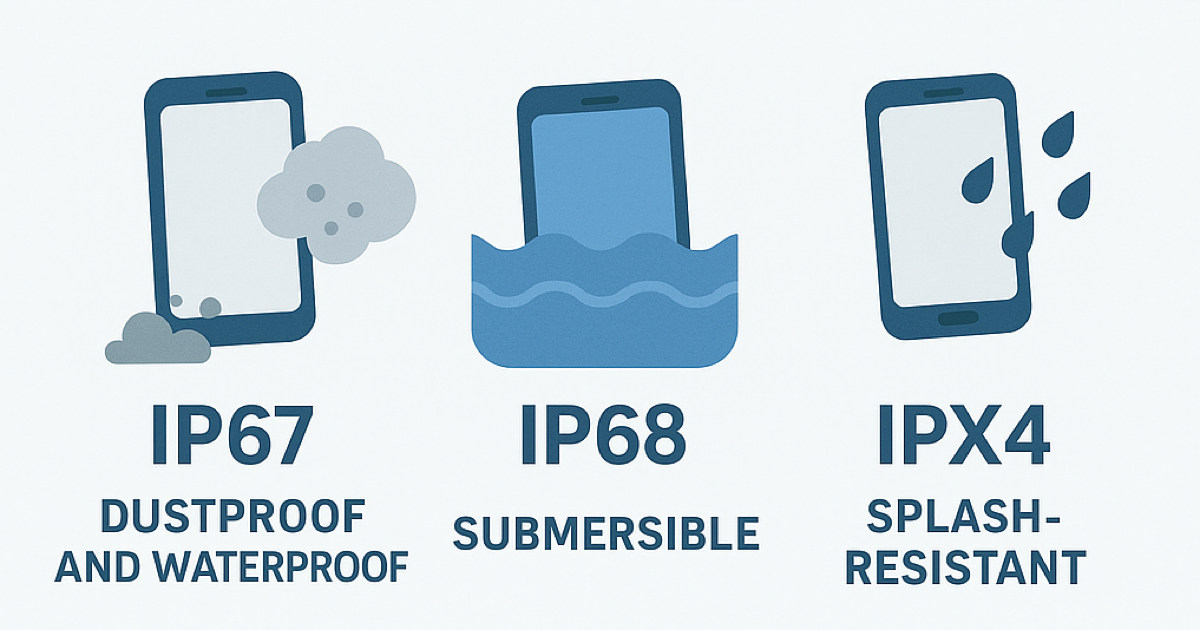This post explains what IP ratings mean for smartphones. An IP rating is a worldwide standard that tells you how well a device is protected from things like dust and water. Knowing about IP ratings can help you choose a phone that won’t get damaged if it gets wet or dirty.
1. What is an IP Rating?
What it is: “IP” stands for “Ingress Protection.” It’s a rating that tells you how well a device is sealed from the outside world.
What it does: The rating tells you if the phone is protected from dust and water (up to a certain point).
How it looks: The rating is shown as “IP” followed by two numbers, like IP67 or IP68.
The first number (0-6): This number tells you how well the phone is protected from solid things like dust. The higher the number, the better the protection.
The second number (0-9): This number tells you how well the phone is protected from liquids like water. The higher the number, the better the protection.
A simple rule: The higher the numbers, the better the phone is protected.
2. Common IP Ratings and What They Mean:
Here are three common IP ratings you’ll see on phones today:
IP67: This means the phone is protected from dust and can be underwater up to 1 meter (about 3 feet) for 30 minutes.
IP68: This is even better. It means the phone is safe in up to 1.5 meters (about 5 feet) of water for 30 minutes.
IP69: This is the best rating right now. A phone with this rating can survive being sprayed with high-pressure water and being put deeper in water. This is a good choice for people who use their phones in rough environments.
3. What This Means When You’re Buying a Phone:
Really Water-Resistant: A phone with an IP68 or IP69 rating is considered to be truly water-resistant and dustproof.
What to Look For: If you want a phone that can survive being splashed, rained on, or even dropped in a pool, you should look for a phone with at least an IP68 rating.
Not Just for Expensive Phones: A few years ago, only the most expensive phones had high IP ratings. But now, you can find phones from brands like Redmi, Realme, Motorola, and iQOO with IP67 and IP68 ratings for under ₹20,000.
What to Do: If water resistance is important to you, always check the IP rating before you buy a phone.
In short, understanding IP ratings helps you choose a phone that is tough enough to handle everyday accidents with dust and water.
FAQ
What does “IP rating” mean for smartphones?
IP stands for Ingress Protection, and it is a global standard that indicates how well a smartphone is protected against solid particles like dust and liquids such as water or other spills.
How is an IP rating structured and what do the numbers represent?
An IP rating is written as “IP” followed by two digits, like IP67 or IP68. The first digit, ranging from 0 to 6, indicates the level of protection against solid particles like dust. The second digit, from 0 to 9, signifies the level of protection against liquids. Generally, a higher number in either position means better protection for the device.
Common IP ratings and their meanings include: IP67: This rating means the phone is fully protected from dust and can withstand immersion in up to 1 meter of water for 30 minutes. IP68: This offers better protection than IP67, allowing the device to be safe in up to 1.5 meters of water for 30 minutes. IP69: This is currently the highest rating available, indicating that the device can survive high-pressure water jets and deeper immersion, offering the most advanced protection.What are some common IP ratings and what do they signify in terms of protection?
Which IP ratings are considered “truly water-resistant and dustproof”?
Smartphones with an IP68 or IP69 rating are considered to be truly water-resistant and dustproof, offering robust protection against environmental factors.
Are high IP ratings only found in expensive flagship smartphones?
No, while high IP ratings were initially exclusive to expensive flagship smartphones like the iPhone 15 and Samsung Galaxy S24, many brands, including Redmi, Realme, Motorola, and iQOO, now offer phones with IP67 and IP68 ratings in the budget segment (under Rs 20,000).
Why is an IP rating important for a smartphone user?
Understanding IP ratings helps users choose a device that can survive unexpected incidents like being caught in the rain, accidental spills, or even drops into water. It provides an indication of the phone’s durability against dust and water damage.
What IP rating should I look for if I want a phone that can handle water spills or rain?
If you want a handset that can handle water spills, rain, or even a brief dip in a pool, you should look for a device with at least an IP68 rating.
What IP rating is recommended for users who operate their devices in rugged environments?
For users who require advanced protection and use their devices in rugged environments, an IP69 rating is the best option currently available in the global market, as it can withstand high-pressure water jets and deeper immersion.
